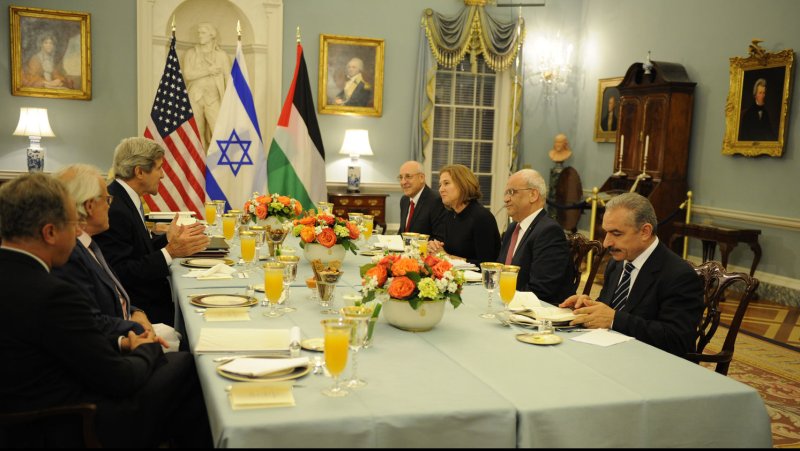1 of 2 | US Secretary of State John Kerry (L) welcomes Israeli and Palestinian delegations for a dinner prior to the opening of peace talks, at the State Department, July 29,, 2013, in Washington, DC. Across the table from Kerry (L-R) Israel's Yitzhak Molcho, Israeli Justice Minbister Tzipi Livni, Palestinian Chief Negotiator Saeb Erekat and Mohammad Shtayyeh. Kerry hopes to restart the moribund peace talks after three years of inactivity. UPI/Mike Theiler |
License Photo
WASHINGTON, July 30 (UPI) -- Israeli and Palestinian leaders have agreed to "remain engaged in sustained, continuous and substantive negotiations" toward a peace treaty, diplomats said.
The Israeli and Palestinian delegations met Monday night and again Tuesday in Washington to discuss a framework for what U.S. Secretary of State John Kerry said both sides have agreed will be at least nine months of peace talks following a three-year gap in face-to-face negotiations.
The two sides are expected to meet to begin formal negotiations in two weeks in the Middle East at a location to be determined.
Despite the initial progress, speaking at the State Department Tuesday, Kerry said the parties expect negotiations will be challenging.
"We all appreciate -- believe me, we appreciate the challenges ahead," Kerry said. "But even as we look down the difficult road that is before us and consider the complicated choices that we face, we cannot lose sight of something that is often forgotten in the Middle East, and that is what awaits everybody with success."
The nine-month time frame provides a period to explore ideas without fear of a walkout, officials said. Given the time and space, Kerry pledged all issues will be discussed.
"The parties have agreed here today that all of the final-status issues, all of the core issues, and all other issues are all on the table for negotiation, and they are on the table with one simple goal: a view to ending the conflict, ending the claims," Kerry said.
Israeli Justice Minister Tzipi Livni, Israel's chief negotiator, said before the dinner she hoped there would be "a better understanding now that it is in the interest of both of our people to reach an agreement to end this conflict."
Israeli Prime Minister Binyamin Netanyahu's special envoy, Isaac Molho, also participated in the talks.
The Palestinian Authority was represented by chief negotiator Saeb Erekat, who negotiated the 1993 Oslo Accords with Israel, and Palestinian President Mahmoud Abbas' close adviser Mohammed Shtayyeh.
The Palestinian delegation had no comment Monday night, but Abbas struck a hard line in Cairo, saying no Israeli settlers or border forces could remain in a future Palestinian state.
"In a final resolution, we would not see the presence of a single Israeli -- civilian or soldier -- on our lands," Abbas said in a briefing to mostly Egyptian journalists.
"An international, multinational presence like in Sinai, Lebanon and Syria -- we are [OK] with that," he said, referring to U.N. peacekeeping operations in those places.
Israeli and Palestinian citizens remain deeply skeptical of the new round of negotiations -- the latest in a two-decade cycle of false starts, dashed hopes and continued violence, Voice of America reported.
Abbas' comments came despite a pledge from all sides not to negotiate in public. Kerry reiterated that point Tuesday.
"The only announcement you will hear about meetings is the one that I just made," he said. "And I will be the only one, by agreement, authorized to comment publicly on the talks, in consultation, obviously, with the parties. That means that no one should consider any reports, articles, or other -- or even rumors reliable unless they come directly from me. And I guarantee you, they won't."
Many Israelis were skeptical Palestinian leaders are truly committed to the peace process after demanding as a precursor to negotiations that 104 Palestinians be released from Israeli prisons -- many of whom were convicted to killing Israelis in terrorist attacks.
Rachel Beckerman, an Israeli Jew from Jerusalem, said the prisoner release will undermine the negotiations.
"The idea of doing concessions or gestures for peace, I think is a mistake because those gestures are interpreted as weakness and it basically makes our negotiating more difficult," she said.
Palestinians such as shopkeeper Adel Jafari expressed similar concerns about the hard-line Israeli government.
"The Israelis they are ruled by very extreme right wing. For them to give anything, it's really, really hard," he said.















